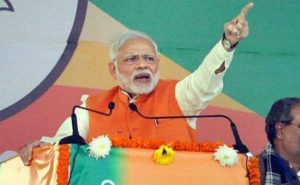 Janjivan Bureau / New Delhi : Prime Minister Narendra Modi on Sunday sought youths’ cooperation in his fight against corruption, saying none will be spared in his anti-graft exercise and noted that three former chief ministers are “rotting” in jail.
Janjivan Bureau / New Delhi : Prime Minister Narendra Modi on Sunday sought youths’ cooperation in his fight against corruption, saying none will be spared in his anti-graft exercise and noted that three former chief ministers are “rotting” in jail.
Speaking at an NCC rally, Modi also made a strong pitch for the use of Aadhaar, saying it has added great strength to India’s development by curbing leakages and helping government money reach its target beneficiaries.
Aadhaar’s legality has been challenged in the Supreme Court, whose Constitution Bench is hearing the matter.
He said people used to believe that the rich and powerful are never touched in anti-corruption measures and asserted that it is no longer so, as three former chief ministers are now “rotting” in jail. Getting rid of this “termite” of corruption will help the poor most.
Former Bihar chief ministers Lalu Prasad and Jagannath Mishra were recently convicted in a fodder scam case and sentenced. Former Haryana Chief Minister O P Chautala is also in jail in connection with a corruption case.
“Youths of India refuse to accept corruption. The fight against corruption and black money will not stop. This is a fight for the future of India’s youths,” he said.
He sought help of NCC cadets and other youngsters in spreading digital transaction, saying it will curb corruption.
Making a strong pitch for the use of Aadhaar, Modi said it has helped save Rs 60,000 crore only in a few government schemes as the money earlier used to go into “wrong hands”.
“These days you keep hearing about Aadhaar. I want to say Aadhaar has added great strength to India’s development. What would earlier get into wrong hands is now going to the intended beneficiaries,” he said.
Exhorting youngsters to promote use to digital transactions, he said, “My young friends, I am here to ask for something. No, I am not here for seeking votes or politics. My appeal is: please further digital transactions through (the BHIM App). Please also get others on that platform. This is a step towards transparency and accountability.”

















